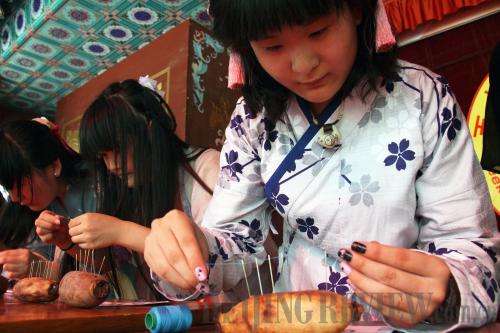|
 |
|
DEXTEROUS FINGERS: Girls take part in a needle-threading competition in a Beijing park on August 2 (ZHANG XU) |
On clear summer nights, looking up into a deep blue sky dotted with twinkling stars, one can easily spot the vast Aquila and Lyra constellations. Within them, their brightest stars—Altair and Vega, respectively—face each other across the Milky Way. Just as we see them shining brightly above today, more than 2,000 years ago, the Chinese storytellers of yore also looked up at these stars, and imagined that Altair and Vega somehow belonged together despite their separation across the infinite galaxy.
According to the legend, Altair represents Niulang (cowherd), and Vega symbolizes Zhinu (weaver maiden). Niulang is a poor mortal, with only an old ox to keep him company, whereas Zhinu, the fairy maiden, is the Emperor of Heaven's daughter. Now some two millennia after its creation, the moving story of this couple continues to be celebrated during the Qixi Festival, which fell this year on August 2.
Origins
Niulang's ox was a heavenly ox that had been exiled to Earth. One day, the cowherd was surprised to hear the ox talk to him, telling him of seven fairy maidens that were coming to bathe and play in a lake in the mountains. The youngest maiden, Zhinu, would be his wife if he seized the moment.
On that day, as the maidens were bathing, Niulang snatched up the clothes of the youngest and hid behind the trees. When all her sisters had flown away, Zhinu found her clothes gone and that she had been left behind. Niulang appeared from behind the trees, and sincerely asked Zhinu to be his wife. She agreed. They were then married and had two children. Not long after that, however, the old ox died, telling Niulang to peel off its skin after its death. This hide would help him in an emergency.
When the Empress of Heaven, Zhinu's mother, discovered her daughter's marriage to a mere mortal, she was furious. Zhinu was told to return to heaven immediately, but refused to leave. Thus, the Empress of Heaven came to Earth and stole her away.
Finding Zhinu missing, Niulang remembered the old ox's last words and put on its skin. This gave Niulang the ability to fly, so he shouldered his two children, both in baskets, and took off after the women. Seeing that Niulang would soon catch up with them, the empress took out her hairpin and scratched a wide river in the sky, creating the Milky Way. Niulang could not cross such a wide, swollen river, and the couple and their children wept bitterly along the shores, heartbroken. Seeing this, magpies across the world found the depth of their love touching, and flew up to form a bridge across the galaxy.
Finally, the empress allowed the family to meet each other on the bridge of magpies once a year, on the seventh day of the seventh lunar month, now known as Qixi, meaning the "night of sevens."
Legend has it that Zhinu was in fact a very smart fairy maiden, capable of weaving beautiful cloth and sewing together seamless clothes. Beautiful afterglows on the margins of the sky are said to be her work. Thus, during the annual festival, when Zhinu is said to be in an especially good mood, girls worship her, hoping she will endow them with wisdom and sophisticated skills. For this reason, Qixi is also known as the Qiqiao ("beseeching skillfulness") Festival. The love of the couple also moves some to pray for faithful love and marriage.
Customs
In ancient times, the date of Qixi was fixed according to the location of Vega in the sky. It appeared to be its brightest in early autumn, during the seventh month of the Chinese lunar calendar, hence the setting of the date.
Qixi was formally listed as a festival during the Han Dynasty (206 B.C.-A.D. 220), when girls would put on beautiful dresses to compete in needlework, as recorded in Miscellany of the Western Capital, an unofficial record of historical events written some 1,600 years ago—the earliest documentation of this festival.
According to Liu Zongdi, a researcher at the Institute of Ethnic Literature in the Chinese Academy of Social Sciences, needlework became an important aspect of the holiday because it falls in early fall, when the weather is becoming cool. Women would need to make warm clothes for the coming cold. At that time, weaving and needlework skills were the criteria by which a girl's hands and mind were judged, both prerequisites for being a good wife and mother.
The customs of the Qixi celebration have varied slightly over time, but the theme of appealing for skillfulness has remained unchanged. In some areas, girls and young women offer fruit and pastries to Zhinu as sacrifices, praying to be blessed with intelligence and wisdom. In other areas, spiders are put into small boxes on the night of Qixi, and if the spider weaves a perfect web inside, it is believed that Zhinu is offering positive feedback. The "owners" of those spiders, then, will be blessed by her with wisdom and good skills.
|
